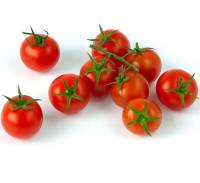Tomato
| Botanical Information |
| Order | Solanales |
| Family | Solanaceae |
| Genus | Solanum |
| Common Name | Tomato |
| Species | Cherry |
Maturity days
Planting Months
| Planting months |
| Jan | Feb | Mar | Apr | May | Jun | Jul | Aug | Sep | Oct | Nov | Dec |
| | | | X | X | X | X | X | | | | |
Permaculture uses
| Permaculture uses |
| Usage 1 | Usage 2 | Usage 3 |
| | | Vegetable |
| Growing Condition | Comment |
| Drought Tolerant | |
| Humidity tolerant | |
| Planting area | Wicking_bed |
| Sunlight | Full_sun |
Photos
Grown as an annual in NQ. Fruit fly attack in summer, heat kills in summer.
Space plants: 40 - 60 cm apart Compatible with (can grow beside): Asparagus, Chervil,Carrot, Celery, Chives, Parsley, Marigold, Basil Avoid growing close to: Rosemary, Potatoes, Fennel, Cucumber Tomatoes need feeding. In a garden bed, compost and mulching will produce a crop from one or two plants. In containers, use some suitable long term fertiliser pellets or feed regularly when you water. Feeding also improves the flavour of the fruit. Tomatoes should be grown in shelter or under cover in cool climates. Determinate: Compact bush growth, stops at a specific height and useful for containers. If left without supporting stakes, they will form a dense carpet which excludes weeds and keeps the soil cool and damp. Indeterminate: Will continue growing a main stem, or vine until stopped by frost. The majority of heirloom tomatoes are indeterminate. Both types need stakes to give them some support otherwise they will sprawl across the garden. Varieties include Acid-free, Bush, Tall, Cherry, Yellow and many others.
